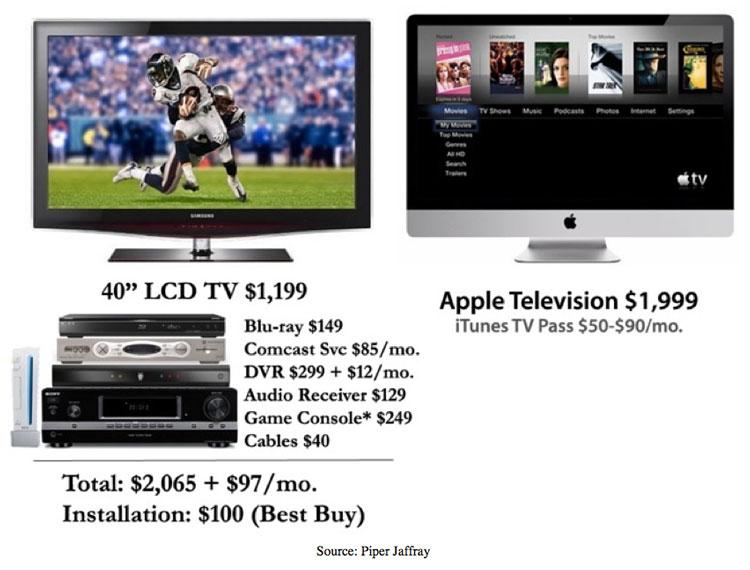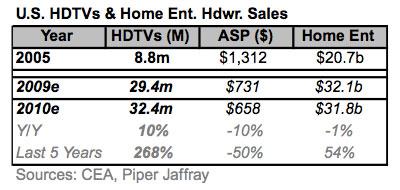Piper: Mac mini with HDMI shows Apple's interest in selling HDTVs
Released last month, the new Mac mini with an HDMI port starts at $699 and allows easy connectivity to an HDTV. HDMI, or High-Definition Multimedia Interface, is a cabling standard intended for home theater, built on top of the computer-oriented DVI, or Digital Video Interface, specification.
Piper Jaffray analyst Gene Munster has long been convinced that Apple wants to get into the HDTV business, and he interpreted the introduction of the first Mac with an HDMI port as evidence that the Cupertino, Calif., company is continuing on that path. He still believes that Apple would introduce such a product within the next 2 to 4 years.
He also acknowledged that Apple Chief Executive Steve Jobs said last month that the Apple TV product remains a hobby because there isn't a viable market, due to the fact that existing set top boxes are heavily subsidized by cable operators. "That pretty much squashes any opportunity for innovation," Jobs said at the All Things D conference, "because nobody's willing to buy a set top box."
But Munster said he believes Apple could solve all of these hurdles with an Internet-connected, all-in-one Apple television.
"In the connected TV market software, content and portability would be key differentiators for Apple with a premium all-in-one solution (different than Apple TV or Mac mini)," he wrote. "The set top box and live TV content are the primary hurdles that remain."
Munster's solution sees Apple offering an Internet-based iTunes TV subscription for between $50 and $90 per month, effectively replacing a user's $85-per-month average cable bill and offering access to current and older episodes of select shows on select channels.
"Additionally, this hurdle could be solved with the addition of an App Store for the TV, offering apps like Hulu Plus (currently available for the iPhone and iPad) with current TV content through Hulu for $10/month," he said.
The Hulu Plus applications and premium service were launched this week, offering viewers the ability to watch every episode of every season of a number of shows from broadcast networks in the U.S. However, the CEO of Hulu has insisted that the service is not intended to replace a customer's cable subscription.
Munster believes Apple could be the savior of the TV business, where the average selling price of HDTVs and home entertainment has fallen by more than 50 percent. He believes a connected TV with a greater emphasis on software and Web content could lift the average selling prices of HDTVs. Apple, as a company experienced in marrying hardware and software, would be an ideal fit, he said.
"History shows that Apple can succeed by redefining mature markets (portable music, mobile phone)," he said. "Home entertainment systems aare combinations of an expensive HDTV, complicated A/V components, and a monthly service fee often with a total sticker price of $2,000+... We believe Apple is uniquely positioned to combine these elements and charge a premium ($2,000) for an Apple-branded television at a sticker price that would be competitive with most home entertainment systems."
 Sam Oliver
Sam Oliver












 Andrew Orr
Andrew Orr
 Sponsored Content
Sponsored Content
 Malcolm Owen
Malcolm Owen

 William Gallagher
William Gallagher

 Mike Wuerthele
Mike Wuerthele
 Christine McKee
Christine McKee






